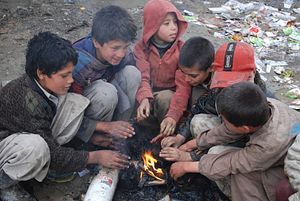When Special Representative for Children and Armed Conflict, Radhika Coomaraswamy was asked to comment on the attitude of bacha bazi in Afghanistan her instant reply was “Let’s not talk about it.”
Literally translated, bacha bazi means “playing with kids,” and is slang for sexual slavery and child prostitution that thrives across Afghanistan and certain parts of Pakistan. Prepubescent boys between ages of 14 to 18 are sold to wealthy and powerful patrons for entertainment and illicit sex. Women are not allowed to dance in public, and so the boys are made to perform feminine gestures and acts.
Beardless and effeminate boys are highly sought after by patrons, often powerful merchants or warlords who can indulge with impunity. Large halls are used as venues for the parties, where the boys dance clad in women’s clothing with bells tied to their feet and a scarf wrapped around their face as they parade for hours. The parties also provide an opportunity for buying and selling. Once the party concludes the boys are sold to the highest bidder or shared for sex. In return they are given small tokens of money and food.
This tradition is seeing a revival in the north of the country. Former commanders in the Northern Alliance are a part of a syndicate that is resurrecting bacha bazi, which serves as a status symbol. For those who cannot afford to buy children, DVDs are sold openly on the streets. Some boys are sold by their parents, others are lured from the streets with the promise of a better life.
Although bacha bazi is outlawed in Afghanistan, being against both sharia law and the civil code, there is little enforcement. Muhammad Ibrahim, deputy Police Chief of Jowzjan denies that the practice continues: “We have not had any cases of bacha bazi in the last four to five years. It does not exist here anymore.”
According to Abdulkhabir Uchqun, an MP from northern Afghanistan, however, the tradition “is on the increase in almost every region of Afghanistan. I asked local authorities to act to stop this practice but they do not do anything.” Indeed, the evidence suggests the tradition is making a comeback, and official connivance is rife.
Nascent democracies are susceptible to corruption, and often feature weak judicial systems, corporatism, and the absence of the rule of law. Poverty meanwhile fuels the trade in boys, just as it does illegal prostitution or trafficking. Bacha bazi is a disturbing practice that entangles the most vulnerable boys.
A 2010 documentary looked at the revival of the tradition, produced by journalist Najibullah Quraishi. When the film was first shown in Afghanistan, national embarrassment was acute and some of the featured men were arrested. However, they were shortly back on the streets.
Bacha bazi was banned by the Taliban. Today, though, the government is preoccupied with a growing insurgent movement and is unable to tackle the problem. Meanwhile, the men who indulge enjoy the feeling of absolute power they have over the dancers. Most of the boys are from rural areas who flee to the streets to make a living. Poverty and class has amplified the tradition, with destitute children or impoverished families selling their sons to survive.
The Independent Human Rights Commission in Kabul is one of the few organizations that have attempted to address the practice and protect the victims. Quaraishi insists that world leaders need to put pressure on the Kabul administration and take action against the perpetrators. Afghanistan is still struggling to empower its disenfranchised youth, who account for 68 percent of the population. While President Hamid Karzai signed an agreement to ban bacha bazi, corruption, lawlessness and poverty will allow the business to thrive. Moreover, combating the abuse of poor children is not seen as a priority by the Kabul administration. While Khaled Hosseini’s novel The Kite Runner exposed bacha bazi, greater international pressure is needed to bring the odious practice to an end.
Roshni Kapur is a graduate of the University of London.

































